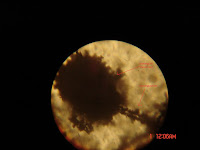Mycology #2
Rhizopus stolonifer (Bread mold)
under general environment
 |
| Rhizopus stolonifer has grown on a piece of bread - the black spots indicate the formation of sporangium (spore sac) |
The fungus was grown under general environment, a piece of bread was cut, put in a small box containing some water, which accelerated the growth of Rhizopus stolonifer or in other words the black mold which usually attacks bread.
It is considered to be a mesophilic fungus since it rapidly grows between temperatures of 15*C - 30*C.
It's classification, Division: Amastigomycota
Sub-division: Zygomycotina
Class: Zygomycetes
And this class by which this fungus belongs to are characterized by
- Terrestrial.
- Doesn't form any type of swarm spores ( they are spores that have mobility function (motile) which has a flagellum used for locomotion)
- Spores are dispersed either by air or by soil.
- Each fungus consists of mycelium ( somatic structure of the body) which form filamentous hyphae have large proportion of chitin) - Mycelium is a network of hyphae
- The cell wall is formed of chitin
- Saprophytic ( little parasitism on plants and animals )
- Reproduce asexually by sporangiospores which are non-motile formed within sporangium (sac) reproduce by conidia ( single or chain cells present on the top of conidiophores)
- Reproduce sexually by Zygospore due to 2 sex organs similar in shape, size, and aren't differentiated from each other but physiologically different.
The following pictures discuss the structure of the fungus under microscope ( made by me)
 |
| Sporangiophore and sporangium |
 |
| Structure of Rhizopus stolonifer under microscope |
Life cycle of Rhizopus stolonifer
 |
| Source: http://bioweb.uwlax.edu/bio203/2011/olbrantz_chri/reproduction.htm |
Source: Microbiology course no. 07201
Latest topics
* https://allaboutbiologyworld.blogspot.com/2017/07/detection-of-catalase-in-potatoes.html
* https://allaboutbiologyworld.blogspot.com/2017/07/cob-clot-on-boiling-test.html
* https://allaboutbiologyworld.blogspot.com/2017/06/cell-division-mitosis-meiosis-comparison.html
I hope you find this informative and if you do please follow my blog if you still hadn't and share it with your science buds.
Penicillium digitatum topic - https://allaboutbiologyworld.blogspot.com/2017/04/todd-has-been-sick-short-tale.html
Thanks!
No comments:
Post a Comment